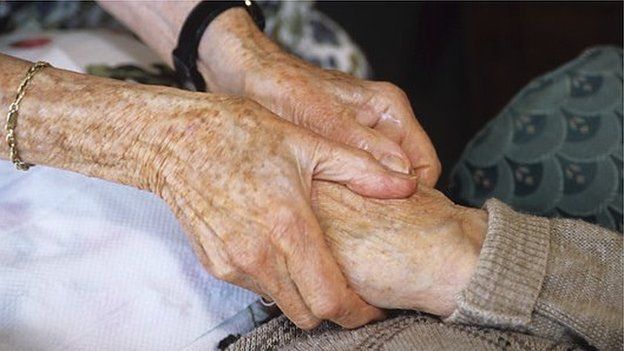NHS 'should work more closely with hospices'
- Published

Hospices could play a greater role in end-of-life care and stop hospitals being the "default option", says former Tory party leader Lord Howard.
About half of people die in hospital - despite 80% preferring not to.
Michael Howard, who is chairman of Help the Hospices, urged the NHS to work more closely with hospices to give people more choice at the end of life.
The group is looking to set up a series of formal pilots in England later this year to see what could be achieved.
The trials could involve hospice staff being placed in hospitals or providing more care in people's homes.
There are examples of this already happening.
For example, Watford General Hospital regularly has hospice staff on wards to help ensure those who want help from local hospices get it.
'Last resort'
Other areas are sending nurses into people's homes to provide end-of-life care, such as pain relief and emotional support.
Help the Hospices believes extending such schemes could reduce the number of people dying in hospital by a 50,000 - a fifth.
But the hospice movement says attempts to expand these schemes are hindered by a lack of money.
About a third of their funding comes from the NHS with the rest relying on charitable donations.
Help the Hospices hopes the pilots will help establish an evidence-base for such schemes to reduce the numbers dying in hospital.
Currently about half of the 500,000 people who die each year do so in hospital - despite 80% saying they would prefer to die elsewhere, according to the National Bereavement Survey.
Lord Howard said: "Hospital has become the default option for dying people and for an increasing number of frail elderly people.
"Hospital should be the last resort at the end of life, not the first one. Hospices can provide the solution."
The Department of Health said it was looking at improving options at the end of life.
A review - led by National Council for Palliative Care chief executive Claire Henry - was launched earlier this month looking at what extra support was needed to give people more choice.
Its findings are due in February 2015.
Care and Support Minister Norman Lamb said: "We want to make sure that care for people nearing the end of their lives is compassionate and reflects their wishes, including their preferences about where they want to receive care.
"I welcome Help the Hospices' commitment to improving care at the end of life and their willingness to work with the NHS."
- Published4 July 2014
- Published23 October 2013
- Published15 July 2013
- Published26 November 2012